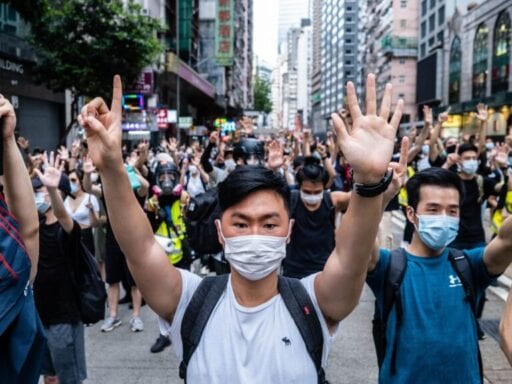The move represents a rare moment when American tech companies question China’s tight grip on information.
/cdn.vox-cdn.com/uploads/chorus_asset/file/19433750/open_sourced_story_logo.png)
The social media company TikTok has announced that it will no longer operate in Hong Kong, marking the most aggressive move yet by a technology company in response to the implementation of a new national security law that’s already being used to crack down on dissent in the region.
“In light of recent events, we’ve decided to stop operations of the TikTok app in Hong Kong,” a spokesperson for the social media company told Recode.
Notably, TikTok has faced ongoing criticism and skepticism from American lawmakers over its relationship with its Beijing-based parent company, ByteDance, which also runs a similar, separate app in China. On Monday, Secretary of State Mike Pompeo said the United States is considering banning the app, among other Chinese social media apps, though it’s not clear how such a prohibition would be enforced. In response, TikTok said it would never provide user data to the Chinese government, and it would refuse such a request. The company’s recent transparency report does not include any requests for data from China.
TikTok’s decision comes as other major tech companies — namely Facebook, Google, Microsoft, Twitter, and Zoom — have said they would stop processing Hong Kong government requests for user data. The companies are pushing back against a new national security law that went into effect earlier this month and could quash free speech and dissent in the region. The pushback also represents a rare moment when big American tech companies are contesting China’s tight grip on information in the country.
“Last Wednesday, when the law took effect, we paused production on any new data requests from Hong Kong authorities, and we’ll continue to review the details of the new law,” a Google spokesperson told Recode.
Meanwhile, Apple has remained more cautious.
“We’re assessing the new law, which went into effect less than a week ago, and we have not received any content requests since the law went into effect,” a spokesperson for the company told the Guardian, adding that the company typically does not receive requests directly from the Hong Kong authorities.
Backlash against the imposition of the new national security law in Hong Kong has been brewing for over a year. Because Hong Kong has historically operated with some degree of autonomy from China, protesters took to the streets in March 2019 after a proposed bill in Hong Kong would have allowed extradition of suspects to mainland China. More than a year later, the Chinese government imposed the sweeping new national security law and began enforcing it on July 1, when the full text of the law was released for the first time. Among other things, the new law specifically criminalizes “secession, subversion, organization and perpetration of terrorist activities, and collusion with a foreign country or with external elements to endanger national security.” The law also applies online and gives authorities the right to remove posts.
While it’s so far unclear how officials will enforce the new law, Hong Kong police quickly arrested several protesters for doing things like waving Hong Kong independence flags and holding signs calling for Hong Kong’s independence. As many worry about the extent to which the new law will be used to silence dissenters online, social media companies are springing to action.
In response to the law, Facebook specifically cited concerns over the protection of free speech; WhatsApp, which is owned by Facebook, is also pausing requests for user data from Hong Kong authorities. “We believe freedom of expression is a fundamental human right and support the right of people to express themselves without fear for their safety or other repercussions,” a Facebook spokesperson told Recode, adding that the company will continue to analyze the new law and conduct “formal human rights due diligence and consultations with international human rights experts.”
Facebook, like many tech companies, has worked with the Hong Kong authorities in the past. In the second half of 2019, Facebook produced at least some data in response to just under half of the requests it received from the Hong Kong government.
Twitter said that, after the national security law went into effect last week, it immediately paused its processing of Hong Kong authorities’ requests for user data and that government-issued requests will be disclosed publicly. A Twitter spokesperson told Recode the company “is committed to protecting the people using our service and their freedom of expression” and will be “reviewing the law to assess its implications, particularly as some of the terms of the law are vague and without clear definition.”
The secure messaging app Telegram, which has been popular during the Hong Kong protests, announced that it had suspended its process for responding to user data requests from Hong Kong authorities. Meanwhile, the encrypted message app Signal said in a tweet that it would have announced it was stopping but “never started turning over user data.” The company added, “Also, we don’t have any user data to turn over.”
Update: This story has been updated to include statements made by TikTok, Apple, and other technology companies.
Open Sourced is made possible by Omidyar Network. All Open Sourced content is editorially independent and produced by our journalists.
Support Vox’s explanatory journalism
Every day at Vox, we aim to answer your most important questions and provide you, and our audience around the world, with information that has the power to save lives. Our mission has never been more vital than it is in this moment: to empower you through understanding. Vox’s work is reaching more people than ever, but our distinctive brand of explanatory journalism takes resources — particularly during a pandemic and an economic downturn. Your financial contribution will not constitute a donation, but it will enable our staff to continue to offer free articles, videos, and podcasts at the quality and volume that this moment requires. Please consider making a contribution to Vox today.
Author: Rebecca Heilweil
Read More



